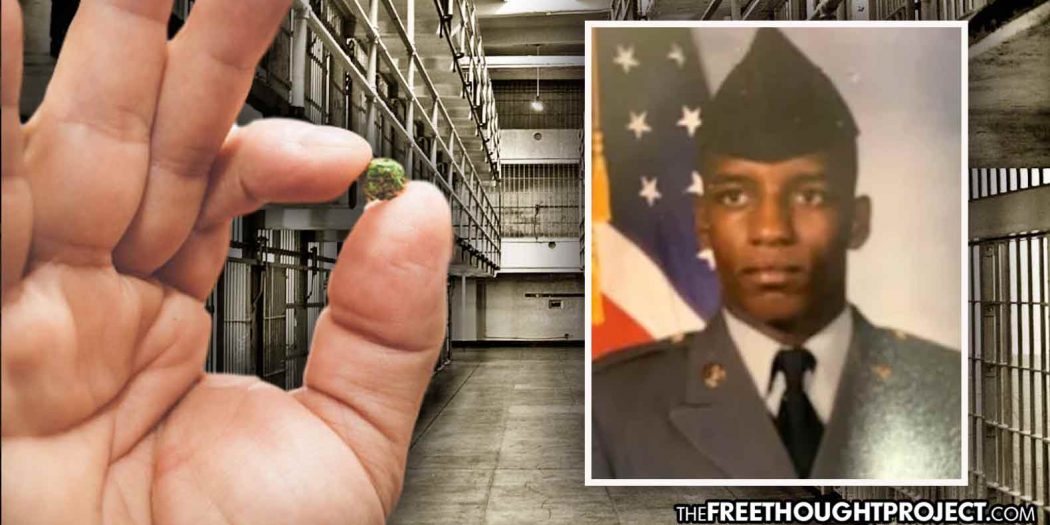Derek Harris is an honorably discharged veteran who put his life on the line for his country in Operation Desert Storm. His years of service to his country were but dust in the wind, however, to the state who threw him in a cage for the rest of his life for selling less than a gram of weed to an undercover cop. After rotting behind bars for more than a decade, Harris has finally gotten some good news as the drug war comes crumbling down.
According to his attorney, Harris was resentenced to time served and will soon be released. Prosecutors in Vermilion Parish agreed to release Harris from prison after the Louisiana Supreme Court granted him a new hearing last month, said his lawyer Cormac Boyle, according to FOX 59.
The Eighth Amendment of the U.S. Constitution reads as follows: Excessive bail shall not be required, nor excessive fines imposed, nor cruel and unusual punishments inflicted. Here at the Free Thought Project we feel that life in prison without the possibility of parole for selling .69 grams of a plant is not only excessive but extremely cruel. Sadly, however, it is not unusual but at least Harris’ nightmare will soon be over.
Harris’ nightmare began back in 2008 when an undercover cop knocked on his door and asked to buy some weed. Harris had just .69 grams — barely enough to roll two joints — and sold it for $30. He was then raided by police, kidnapped and thrown in a cage. In 2012, 15th Judicial District Judge Durwood Conque found Harris guilty of marijuana distribution, a Vermilion Parish prosecutor invoked the state’s habitual-offender law, and Conque sentenced Harris to life as a four-time loser.
Harris had struggled with mental illness since he came back from Iraq. This led him down a path of addiction and to maintain that addiction, Harris sold drugs and stole small items. However, Harris never hurt anyone and all of his crimes were misdemeanors.
As NOLA.com reports:
Harris’ prior convictions dated back to a 1991 conviction for dealing cocaine, according to court filings. He was subsequently convicted of simple robbery in 1992 and 1993, simple burglary in 1997 and theft under $500 in 2005, said Cormac Boyle, an attorney with the Promise of Justice Initiative who argued Harris’ case Monday.
Boyle said ample evidence suggests a struggle with mental illness linked to his military service, not a penchant for criminality behind his rap sheet. But that mitigating evidence never came up as Conque dealt Harris a life sentence with no shot at parole under a habitual-offender law that gives prosecutors broad discretion.
“Courts have a duty to make sure the punishment fits the crime. That didn’t happen here,” Boyle argued at the initial review. “This court has always retained the right to say a sentence is excessive.”
“His prior offenses were nonviolent and related to his untreated dependency on drugs,” Louisiana Supreme Court Justice John Weimer wrote in his opinion.
Prosecutors argued that if Harris’ sentence was overturned, it will let hardened criminals back out on to the streets. But this is simply not true. This habitual offender statute is the reason Louisiana has become the incarceration capital of the entire planet.
“These extremely long and excessive sentences, you’re not really able to challenge them once you receive them and so we have a disproportionate number of people serving life without parole and a disproportionate number of people in prison,” says Mercedes Montagnes, Executive Director at the Promise of Justice Initiative.
“Mandatory life for the smallest amount of marijuana. Does it violate the 8th Amendment? Is it excessive? That’s what we’re talking about,” Chief Justice Bernette Johnson said.
It’s not just life sentences for pot that are excessive. Any time anyone is deprived of their freedom or extorted by government for possessing or partaking in this plant, it is cruel and excessive, yet sadly it remains a function of this entire system.
“Americans should be outraged that police departments across the country continue to waste tax dollars and limited law enforcement resources on arresting otherwise law-abiding citizens for simple marijuana possession,” NORML Executive Director Erik Altieri said. We agree.
This article was originally featured at The Free Thought Project and is republished with permission.































